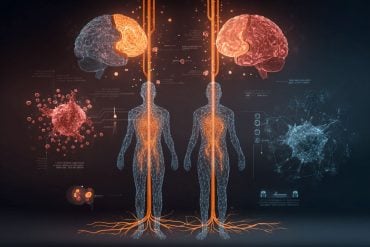Summary: Researchers theorize social ‘survival mode’ triggers the preference for greater personal space in lonely people.
Source: University of Chicago.
A new study from the University of Chicago found that people who report feeling lonely also say they sit or stand physically farther away from close friends and family. Their “personal space” for intimate partners is larger than those who report less loneliness, even when adjusted for marital status and other factors such as gender, anxiety and depression.
In two experiments, published Sept. 6 in PLOS ONE, the researchers surveyed nearly 600 U.S.-based men and women on how far they preferred to sit or stand near different groups of people, including friends and family, romantic partners and acquaintances. On average, loneliness doubles the odds of someone staying farther away from those in their closest circle of intimacy. (It had no effect on how far they preferred to stand from acquaintances or strangers).
“To our knowledge, this is the first direct evidence for a link between interpersonal distance preferences and loneliness,” said Elliot Layden, a UChicago graduate student and first author on the paper. “This finding may be important to consider in the context of loneliness interventions—such as client-therapist interactions and community programs seeking to combat loneliness.”
The effect persists even when scientists adjusted for how much social interaction the person experiences; for example, those who felt lonely despite high levels of social interaction still kept their distances.
“You can feel alone even in a crowd or in a marriage—loneliness is really a discrepancy between what you want and what you have,” said Stephanie Cacioppo, director of the Brain Dynamics Laboratory, assistant professor of psychiatry and behavioral neuroscience, and senior author on the paper.
The authors say this fits with the evolutionary model of loneliness, pioneered by Stephanie Cacioppo and her late husband, John Cacioppo, the Tiffany and Margaret Blake Distinguished Service Professor of Psychology at the University of Chicago and a co-author on the paper, who passed away earlier this year. The Cacioppos’ transformative work in this field connected feelings of loneliness to physical health outcomes, including sleep disturbances, inflammation and earlier death.

The evolutionary model suggests that even though loneliness might be expected to prompt people to move closer to others, it also increases an individual’s short-term self-preservation instincts, triggering an instinct to stay farther away. Previous Cacioppo studies using neuroimaging techniques have found evidence that lonelier individuals also exhibit heightened vigilance for social threats—such as social rejection or interpersonal hostility.
“This ‘survival mode’ means that even though a lonely person wants more social interaction, they may still unconsciously keep their distance,” Stephanie Cacioppo said. “The hope is that by bringing this to conscious attention, we can reduce the incidence of divorce as a byproduct of loneliness and increase meaningful connections among people.”
Cacioppo and her team are working to incorporate the finding into a program to reduce loneliness with the National Institutes of Health, she said. In further studies, she wants to explore gender differences in personal space; men are consistently found to prefer larger personal spaces than women.
Funding: This work was supported by the National Institutes of Health.
Source: Louise Lerner – University of Chicago
Publisher: Organized by NeuroscienceNews.com.
Image Source: NeuroscienceNews.com image is adapted from the University of Chicago news release.
Original Research: Open access research for “Loneliness predicts a preference for larger interpersonal distance within intimate space” by Elliot A. Layden, John T. Cacioppo, and Stephanie Cacioppo in PLOS ONE. Published September 6 2018.
doi:10.1371/journal.pone.0203491
[cbtabs][cbtab title=”MLA”]University of Chicago”Lonely People Stand Farther From Loved Ones.” NeuroscienceNews. NeuroscienceNews, 8 September 2018.
<https://neurosciencenews.com/lonely-distance-9826/>.[/cbtab][cbtab title=”APA”]University of Chicago(2018, September 8). Lonely People Stand Farther From Loved Ones. NeuroscienceNews. Retrieved September 8, 2018 from https://neurosciencenews.com/lonely-distance-9826/[/cbtab][cbtab title=”Chicago”]University of Chicago”Lonely People Stand Farther From Loved Ones.” https://neurosciencenews.com/lonely-distance-9826/ (accessed September 8, 2018).[/cbtab][/cbtabs]
Abstract
Loneliness predicts a preference for larger interpersonal distance within intimate space
ILoneliness is thought to serve as an adaptive signal indicating the need to repair or replace salutary social connections. Accordingly, loneliness may influence preferences for interpersonal distance. If loneliness simply motivates a desire to socially reconnect, then loneliness may be associated with a preference for smaller interpersonal distances. According to the evolutionary model of loneliness, however, loneliness also signals an inadequacy of mutual aid and protection, augmenting self-preservation motives. If loneliness both increases the motivation to reconnect and increases the motivation for self-protection, then the resulting approach-avoidance conflict should produce a preference for larger interpersonal distance, at least within intimate (i.e., proximal) space. Here, we report two survey-based studies of participants’ preferences for interpersonal distance to distinguish between these competing hypotheses. In Study 1 (N = 175), loneliness predicted preferences for larger interpersonal distance within intimate space net gender, objective social isolation, anxiety, depressive symptomatology, and marital status. In Study 2 (N = 405), we replicated these results, and mediation analyses indicated that measures of social closeness could not adequately explain our findings. These studies provide compelling evidence that loneliness predicts preferences for larger interpersonal distance within intimate space, consistent with predictions from the evolutionary model of loneliness.






